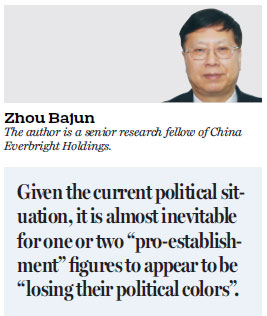Hong Kong's political contest becoming more complicated
Updated: 2017-02-15 07:42
By Zhou Bajun(HK Edition)
|
|||||||
Early this month the opposition camp announced an online "Chief Executive Election Civil Referendum 2017" which would last from Feb 7 to 22. It was initiated by Benny Tai Yiu-ting, a leading architect of the illegal "Occupy Central" movement and the "ThunderGo" program. "ThunderGo" was a vote-appropriation program designed to help opposition parties win half or more of the 70 Legislative Council seats last November.
The "civil referendum" can be seen as a turning point in the fifth-term Chief Executive election. Up to this point, none of those who expressed their desire to be CE election candidates were from the opposition camp, but on Feb 8 this changed. Leung Kwok-hung, also known as "Long Hair", who is a leading figure in the League of Social Democrats and a LegCo member, said publicly he would run for the CE post. Although he is widely considered very unlikely to even secure a nomination, the move may signal that the opposition camp will nominate one of its own people to run for CE.
The opposition camp nominated a person to join the CE race in the 2005 second-term CE by-election, the third-term CE election in 2007 and fourth-term CE election in 2012. In 2005 and 2007, the CE elections pitted the opposition nominee against the pro-establishment side. But in 2012, two pro-establishment nominees dominated the race while the opposition candidate was a mere also-ran. It was a new development in Hong Kong politics.

Before the fourth-term CE election in 2012, most political personalities and public figures were either pro-establishment or opposition. All pro-establishment parties, organizations and dignitaries supported the SAR government as well as the central government authorities.
Since the fourth-term CE election, however, the majority of political figures have maintained their political colors but some others have changed theirs. Among the current CE election hopefuls, Carrie Lam Cheng Yuet-ngor and Regina Ip Lau Suk-yee stand firmly on the pro-establishment side in terms of their principles. But the other two have shown "ambiguity" on certain political principles - even an "inclination" toward agreeing with the opposition's political demands.
For example, one of them agreed that the next SAR government should re-launch constitutional reforms aimed at implementing universal suffrage in both the CE and LegCo elections. But he did not state clearly in his policy platform whether electoral reform should follow the decision by the Standing Committee of the National People's Congress (NPCSC) on Aug 31, 2014. The other one, meanwhile, suggested local legislation should be passed for Article 22 of the Basic Law.
In the Basic Law, Article 23 authorizes that the HKSAR pursue national security legislation "on its own". But there is no such term in Article 22. This means the legislation of Article 22 lacks jurisprudential grounds. The Basic Law can be interpreted and amended when necessary, as shown in the interpretation of Article 22 (4) of the Basic Law by the NPCSC on June 26, 1996. Apparently the suggested legislation of Article 22 is neither an "interpretation" nor an "amendment". The only logical deduction of the proposed legislation of Article 22 would be to challenge the NPC's right of legislation with the HKSAR's right of legislation. This would be a boon for "localism".
Given the current political situation, it is almost inevitable for one or two "pro-establishment" figures to appear to be "losing their political colors". In fact, this phenomenon already emerged amid the controversy surrounding the LegCo swearing-in scandals last October. Some people in the pro-establishment camp are still attached to the old establishment formed before the handover; and some others were heavily exposed to Western ideology. These people don't have the ability to fully understand and correctly implement the "One Country, Two Systems" policy. Moreover, they do not have the political integrity to fight against separatist tendencies. Some of them even extended an olive branch (or two) toward the opposition camp in the belief that their political future would benefit from such gestures.
However, the reality is the "pan-democrat" members of the CE Election Committee (EC) cannot support any pro-establishment candidate even if they nominate one of them. Their votes will surely go to their own candidate in the end.
Opposition members account for about a quarter of the 1,194-member EC this time. That means they can nominate two candidates. On the other hand, the opposition camp has never been more divided than it is right now. The two largest and oldest groups - the Democratic Party and Civic Party - lost their leading position during "Occupy Central". They have yet to nominate a candidate to represent their interests in the CE election. If they don't nominate a candidate to run for the CE's office they will be seen as content to play second fiddle to the radical separatist faction. This would be unthinkable. So, at some stage the "kingmaker(s)" behind the opposition camp will have to present someone - if only to further complicate an already confusing CE election situation.
(HK Edition 02/15/2017 page8)